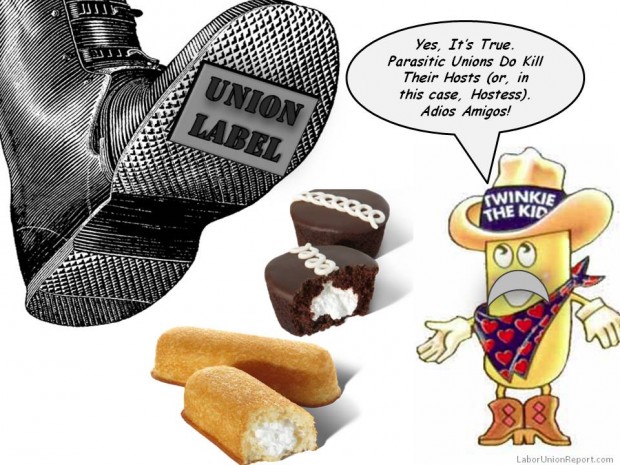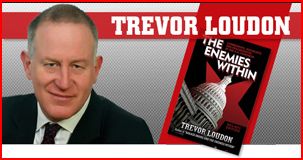By: Citizen Scribe

From LaborUnionReport.com
Please pardon me for borrowing the opening line from pastor Martin Niemöller’s condemnation of standing mute.
His quote is only tangentially related… and yet… germane. Allow me to expand.
On Friday, an American icon in the baked goods industry, famous for breads, cakes, pies and assorted snacks, was pushed over the financial cliff, leaving only the carcass and the name, embodied as closed factories and orphaned brands.
Over the last two days, a couple of themes have emerged in the reportage of this event: 1) that it was all Capitalism’s fault, despite repeated investments from and attempts by capital management firms to save it, and 2) they deserved it; that’s right, they had somehow earned extinction.
Yes, the killing of Hostess was righteous. And why was it righteous? Because, well, they were evil… or something. Well, at the very least, Michelle Obama had an axe to grind with them (or was that a guillotine?), because they were the cause of food deserts or something. And so they got their just desserts.
Now, stay with me here, the elimination of a corporation — a purveyor of American snacks and staples for more than eighty years — and the 18,500 jobs that went with it, was acceptable because people who arrogated unto themselves the authority to tell you what you may eat, and how much had deemed them undesirable.
Undesirable. It doesn’t matter what you and I might have desired. Your government parents deemed it so.
In Terresa’s earlier post, Going Galt and the Neo-Comms, the point was made that people are not property:
Remember, though: people are not property. When Ayn Rand shared the vision of Galt, that was the theme and spirit of it. You may take what I have, but you don’t own me. I am not a slave.
And a beleaguered Hostess, after years of struggling under the yoke of parasitic Neo-Comm manipulation, despite the investment of millions by “evil greedy capitalist bastards” trying to keep it alive, has finally said, “you may take what I’ve built, but you don’t own me.” That’s the essence of going Galt.
People are not property.
Much is implied by that. If I am not property then some other person or body or persons does not own me. If I am not owned then, absent my consent, the product of my labors is not an obligation and is mine to keep, sell or give away. And if I commission the labor to be done as work for hire and pay for it as agreed, the product and all that derives from it are also mine; I owe them to no one. If my work belongs to someone else without my consent, I am a slave.
But if one is to believe the philosophy of envy perpetrated by an impoverished, but angry, business and life failure — an epic loser who died in 1883 — all that is required to achieve entitlement to someone else’s work product, and whatever they have built, is the simple desire to own it. That’s all. It is sufficient to deem that you should have it, and until you then possess it, whatever situation obtains that prevents your having it is, by definition, unfair. You drive a nicer car than I do. I want the nice one that you have, not the junker that is all I can afford. Therefore, justice can only be served when either I obtain your car, or at least you are reduced to owning something as miserable as what I have. Equality of misery is fair.
Success clearly isn’t fair, since it is in its very nature an unequal outcome. It matters not that I may have worked eighty hour weeks. It matters not that I may have lived for months or years on cans of beans and corn, with an occasional sausage. It matters not that I drove an old beater, lived in a run-down apartment, wore faded clothes and had a bad haircut, all while I struggled to bring something viable into being. Once I achieve some measure of success, once my efforts bring me some measure of comfort and an improved measure of quality in my life, magically this is unfair and I should permit it to be distributed among those of lesser ability, lesser initiative, lesser motivation and certainly lesser invested effort. In other words, whatever my initiative, effort and inventiveness yields, it is properly the property of a whole bunch of other people who didn’t build it; I am thus a slave to a self-appointed mob. We want what you have and there are more of us than of you, so resistance is futile; we have elected someone “official” to seize it for us.
Whatever the pie is, regardless of who baked it, we are all entitled to an equal slice, without any need of having worked for it.
And if you won’t give it to us, or give us the share to which we feel we are entitled, we will destroy you.
And then, having bled you dry, we will justify it by declaring that a) you were unfair, and b) that you were undesirable.
Yes, you were undesirable, and that is justification sufficient to erect the gibbet from which to hang you and let your corpse swing in the breeze as an example to all those others who might have similar, unfair, inclinations.
You will do our bidding, or you will wind up like them.
But … but … aren’t we safe? After all, we’re not undesirable, right? We play by all the rules. I mean, those are the rules, right? Nobody would change the rules to make us undesirable… would they?
Yeah, sure, I didn’t have anything personal against Hostess, but what the hell, it’s only a Twinkie. Who cares about a Twinkie?
Oh, I dunno, maybe some of those EIGHTEEN THOUSAND families whose Christmas this year is looking a bit bleaker than last year’s. Maybe they cared about a Twinkie.
It’s only a cupcake and an undesirable one at that. Don’t make a fuss, you’ll only attract attention and make them angry. Turn away. Maybe they’ll leave you alone.
After all, you’re not undesirable. You’re fair-minded. You play by the rules… as they are… today.
Today.
And today they came for the cupcakes.
Will you speak out?
Or will you be next?
















